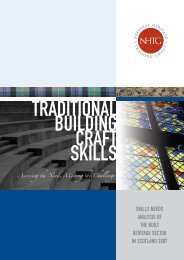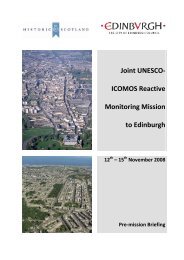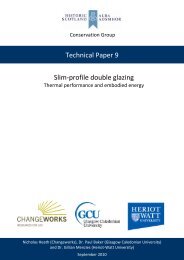NTS Report 4 Aug 2010 - National Trust for Scotland
NTS Report 4 Aug 2010 - National Trust for Scotland
NTS Report 4 Aug 2010 - National Trust for Scotland
Create successful ePaper yourself
Turn your PDF publications into a flip-book with our unique Google optimized e-Paper software.
12<br />
Recommendations on Governance 3<br />
R16: The Review recommends that the President remains a<br />
<strong>Trust</strong>ee until such time as the office is reconsidered in new<br />
legislation.<br />
The <strong>NTS</strong> founding legislation requires the President to be a<br />
<strong>Trust</strong>ee and can be changed only by Parliament. On revision of<br />
the Acts, the <strong>Trust</strong> may wish to revise this requirement so that he<br />
or she is no longer party to Board decisions and can, in<br />
consequence, have an impartial role in the charity’s affairs.<br />
In the meantime, the President will act as ambassador and<br />
guardian of <strong>NTS</strong> corporate memory, and will continue to be<br />
elected at, and chair, the <strong>Trust</strong>’s AGM.<br />
R 17: The Review recommends that the Vice-Presidents are<br />
appointed in an honorary capacity.<br />
Pending revision of the <strong>NTS</strong> legislation, this recommendation<br />
makes clear that Vice-Presidents hold an honorary position and<br />
are not members of the Board of <strong>Trust</strong>ees. They will continue to<br />
be elected at the AGM, ideally from a wide geographical<br />
background, and will carry out ambassadorial functions.<br />
R18: The Review recommends that new <strong>Trust</strong>ees should publish<br />
a code of <strong>NTS</strong> Good Governance.<br />
Details are given opposite on page 13.<br />
It will be <strong>for</strong> the new Board to determine its own working<br />
practices, but it appears to the Steering Group that around eight<br />
meetings per year will be appropriate. The key issue is that<br />
<strong>Trust</strong>ees should concentrate on strategic objectives and not stray<br />
into operational matters or attempt to micro-manage the charity.<br />
The job of the Leadership Team is to run the organisation’s dayto-day<br />
operations. The role of the Board is to encourage, warn<br />
and advise the Chief Executive in the delivery of objectives.<br />
<strong>Trust</strong>ees should expect to commit around 20 days per year to<br />
their role. After election, they should go through a planned<br />
induction process which should be extended to cover<br />
conservation as well as governance and finance. There should<br />
also be periodic review meetings during which <strong>Trust</strong>ees discuss<br />
with the Chairman their contribution to the <strong>Trust</strong>.<br />
R19: The Review recommends that the <strong>Trust</strong>ees should be<br />
assisted in their work by three Standing Committees: Audit,<br />
Investment and Nominations.<br />
The Audit Committee should monitor and analyse the<br />
robustness of the <strong>Trust</strong>’s financial recording and reporting<br />
systems and review its internal controls, risk management<br />
measures and internal audit function. The Committee should<br />
consist of at least three <strong>Trust</strong>ees (one of them its Chair) and two<br />
external members.<br />
The Investment Committee should provide advice and<br />
direction on all financial investments made by or on behalf of<br />
the <strong>Trust</strong>. The Committee should consist of up to a dozen<br />
members, the majority of them external experts with a strong<br />
background in investment. The Committee should be chaired by<br />
a <strong>Trust</strong>ee.<br />
The Nominations Committee should continue to be charged<br />
with ensuring that the <strong>Trust</strong> adopts open and transparent<br />
processes in filling vacancies within the <strong>Trust</strong>’s governance.<br />
After the establishment of the new Board, the Committee should<br />
identify and recommend candidates to the membership <strong>for</strong> the<br />
future election of <strong>Trust</strong>ees. Details of criteria and the<br />
assessment process should be made freely available.<br />
There should be five members of the Nominations Committee :<br />
three <strong>Trust</strong>ees and two external appointments. The Committee<br />
should be chaired by an independent external appointee, with<br />
members serving a single 4-year term. The two external<br />
members of the Committee should be appointed by the Board.<br />
The Review does not recommend the establishment of a Finance<br />
Committee. The necessary experience of financial management<br />
should be secured within the Board of <strong>Trust</strong>ees itself. In the<br />
event of external advice being required, this can be obtained by<br />
the Chair on an ad hoc basis.<br />
The Review does not see the need <strong>for</strong> a Remuneration<br />
Committee. Given the reduction in governance, it believes the<br />
salary and conditions of senior managers can be determined in<br />
discussions between the Chair and the <strong>Trust</strong>ees.<br />
The Review stresses that the work of the Standing Committees is<br />
advisory and that only the Board is responsible <strong>for</strong> the general<br />
control and administration of the charity.<br />
R20: The Review recommends that the Conservation and<br />
Regional Panels continue in an advisory capacity, pending a<br />
reconsideration of their effectiveness by the <strong>Trust</strong>ees.<br />
During the consultation process, the Review received mixed<br />
responses on Panels. Some were seen as excellent and essential,<br />
others as having no particularly effective role. There was also<br />
wide variation in working practice and regularity of meetings.<br />
In addition, problems were reported on the capacity of staff to<br />
service the Panels adequately.<br />
On balance, we believe that the range of specialists available<br />
through the Panel system should be maintained – as a source of<br />
expertise and advice <strong>for</strong> <strong>Trust</strong> staff. It should be made clear that<br />
the Panels are not part of <strong>Trust</strong> governance.<br />
It is essential that Panels are fit-<strong>for</strong>-purpose and meet specific<br />
organisational needs. Their membership, terms of reference and<br />
ways of working should be reviewed after the new Board is<br />
elected and then every three years.<br />
It may be then that <strong>Trust</strong>ees will wish to view the Panels as a<br />
flexible ‘pool’ of advisers whose expertise the <strong>Trust</strong> can draw on<br />
from time to time as corporate needs require.


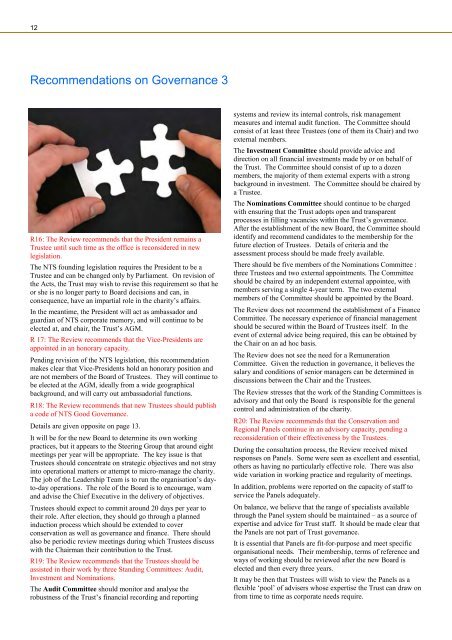
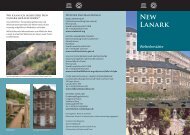
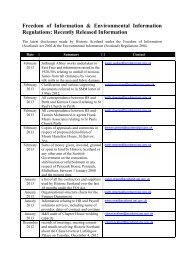
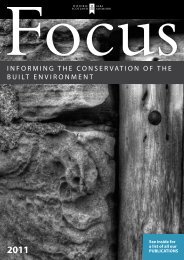
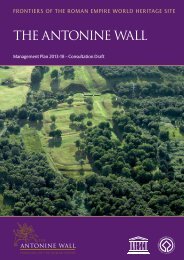
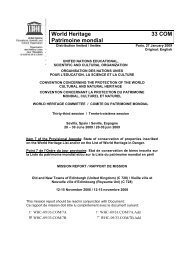

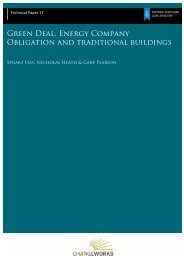
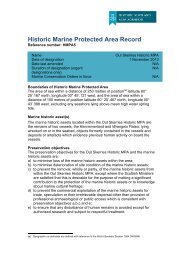

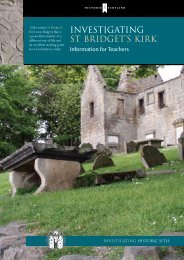
![Elgin Cathedral Wedding Brochure [pdf, 544kb] - Historic Scotland](https://img.yumpu.com/22301571/1/190x151/elgin-cathedral-wedding-brochure-pdf-544kb-historic-scotland.jpg?quality=85)

